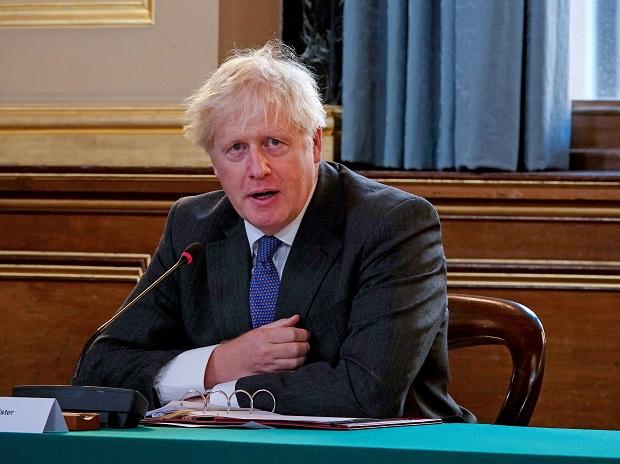UK’s Boris Johnson concedes post-Brexit US trade deal not in the offing

British Prime Minister Boris Johnson conceded Wednesday that a post-Brexit trade deal with the U.S. was not imminent as he revealed that the decades-long U.S. ban on the import of British lamb would be lifted.
A day after President Joe Biden downplayed the prospect of a trade deal by not pushing back on a suggestion that Britain was at the back of the line, Johnson said British farmers, notably those in Wales, would once again be able to export lamb to the U.S.
I can tell you today that what we’re going to get from the United States now is a lifting of the decades old ban, totally unjustified, discriminating on British farmers and British lamb,” he told reporters outside the U.S. Capitol in Washington. It’s about time too. And what we’re wanting to do is make solid incremental steps in trade.”
When campaigning for Britain’s departure from the European Union in 2016, Johnson and other Brexit supporters said one of the great prizes of leaving the bloc would be an overarching trade deal with the U.S. that would see tariffs and quotas eliminated on a wide array of goods.
The Biden administration is not doing free trade deals around the world right now but I’ve got absolutely every confidence that a great deal is there to be done, Johnson said.
Unlike his predecessor Donald Trump, Biden has shown little interest in negotiating a trade deal with Britain, partly because of his concerns about the situation in Northern Ireland.
Ahead of his bilateral discussion with Johnson in the White House on Tuesday, Biden voiced worries about the situation in Northern Ireland following recent talk that the British government wants to renegotiate the post-Brexit deal with the EU that it signed up to at the end of last year.
He said he felt very strongly about issues surrounding the peace process, as problems with the Northern Ireland Protocol persisted. Under that Brexit deal, customs and border checks have been imposed on some goods moving between Northern Ireland and the rest of the U.K. in order to prevent a physical border once again being put up between Ireland, which is part of the EU, and Northern Ireland.
One of the significant achievements of Northern Ireland’s peace process was the nearly invisible border with Ireland.
I would not at all like to see, nor, I might add, would many of my Republican colleagues like to see, a change in the Irish accords, the end result having a closed border in Ireland, said Biden, who has consistently shown pride in his Irish roots.
As well as seeking to respect the rules governing the EU’s single market for goods, the regulations seek to keep an open border between Northern Ireland and Ireland. However, they have angered Northern Ireland’s unionist community, who say the checks amount to a border in the Irish Sea and weaken Northern Ireland’s ties with the rest of the U.K.
Since Britain formally left the economic structures of the EU at the start of this year, the country has sought to re-orientate its trade profile away from Europe. For example, it is pushing to join the 11-country Comprehensive and Progressive Agreement for Trans-Pacific Partnership, which is home to around half a billion people in and around the Pacific.
There’s even talk now that the British government may look to join the trade partnership between the U.S., Canada and Mexico.
(Only the headline and picture of this report may have been reworked by the Business Standard staff; the rest of the content is auto-generated from a syndicated feed.)
 Dear Reader,
Dear Reader,
Business Standard has always strived hard to provide up-to-date information and commentary on developments that are of interest to you and have wider political and economic implications for the country and the world. Your encouragement and constant feedback on how to improve our offering have only made our resolve and commitment to these ideals stronger. Even during these difficult times arising out of Covid-19, we continue to remain committed to keeping you informed and updated with credible news, authoritative views and incisive commentary on topical issues of relevance.
We, however, have a request.
As we battle the economic impact of the pandemic, we need your support even more, so that we can continue to offer you more quality content. Our subscription model has seen an encouraging response from many of you, who have subscribed to our online content. More subscription to our online content can only help us achieve the goals of offering you even better and more relevant content. We believe in free, fair and credible journalism. Your support through more subscriptions can help us practise the journalism to which we are committed.
Support quality journalism and subscribe to Business Standard.
Digital Editor
business-standard.com

